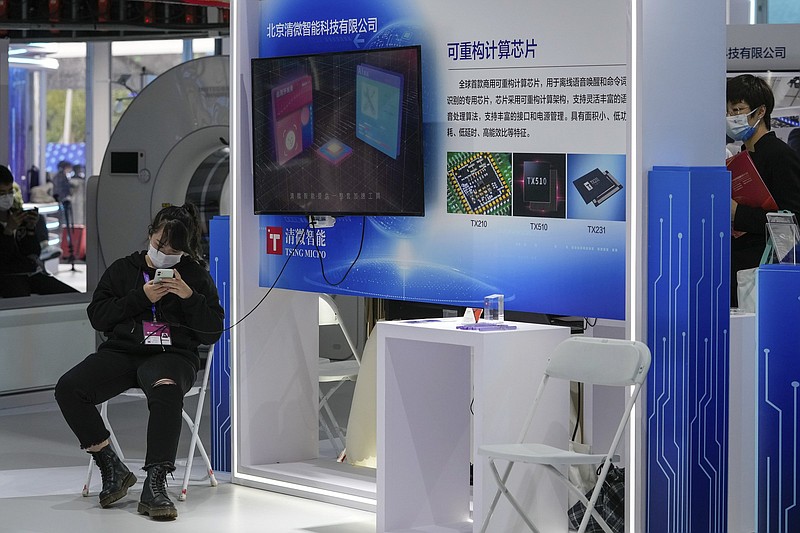BEIJING -- To help make China a self-reliant "technology superpower," the ruling Communist Party is pushing the world's biggest e-commerce company to take on the tricky, expensive business of designing its own processor chips -- a business unlike anything Alibaba Group has done before.
Processor chips play an increasingly critical role in products from smartphones and cars to medical devices and home appliances. Shortages tied to the coronavirus pandemic are disrupting global manufacturing and adding to worries about supplies.
Chips are a top priority in the ruling Communist Party's marathon campaign to end China's reliance on technology from the United States, Japan and other suppliers Beijing sees as potential economic and strategic rivals. If it succeeds, business and political leaders warn that might slow down innovation, disrupt global trade and make the world poorer.
"Self-reliance is the foundation for the Chinese nation," President Xi Jinping said in a speech released in March. He called for China to become a "technology superpower" to safeguard "national economic security."
China might be chasing a costly disappointment. Even with huge official investments, businesspeople and analysts say chip makers and other Chinese companies will struggle to compete if they detach from global suppliers of advanced components and technology -- a goal no other country is pursuing.
"It's hard to imagine any one country rebuilding all of that and having the best technology," said Peter Hanbury, who follows the industry for Bain & Co.
If the world were to decouple, or split into markets with incompatible standards and products, U.S.- or European-made parts might not work in Chinese computers or cars. Smartphone makers who have a single dominant global operating system and two network standards might need to make unique versions for different markets. That could slow down development.
The U.S. and China need to "avoid that the world becomes separated," U.N. Secretary-General Antonio Guterres told The Associated Press in September.
China's campaign is adding to tension with the U.S. and Europe, which see it as a strategic competitor and complain it steals technology. They limit access to tools needed to improve its industries.
CHIPS ARE BIGGEST IMPORT
China's factories assemble the world's smartphones and tablet computers but need components from the United States, Europe, Japan, Taiwan and South Korea. Chips are China's biggest import, ahead of crude oil, at more than $300 billion last year.
Official urgency over that grew after Huawei Technologies Ltd., China's first global tech brand, lost access to U.S. chips and other technology in 2018 under sanctions imposed by the White House.
That crippled the telecom equipment maker's ambition to be a leader in next-generation smartphones. American officials say Huawei is a security risk and might aid Chinese spying, an accusation the company denies.
Huawei and some Chinese rivals are close to matching Intel Corp., Qualcomm Inc., South Korea's Samsung Electronics and Britain's Arm Ltd. at being able to design "bleeding edge" logic chips for smartphones, according to industry analysts.
But when it comes to making them, foundries such as state-owned Semiconductor Manufacturing International Corp. in Shanghai are up to a decade behind industry leaders including TSMC, or Taiwan Semiconductor Manufacturing Corp., which produces chips for Apple Inc. and other global brands.
OUTSOURCED MANUFACTURING
Even companies such as Alibaba that can design chips likely will need Taiwanese or other foreign foundries to make them. Alibaba's Yitian 710 requires precision no Chinese foundry can achieve. The company declined to say which foreign producer it will use.
"My country still faces a big gap in chip technology," said industry analyst Liu Chuntian of Zero Power Intelligence Group.
China accounts for 23% of global chip production capacity but only 7.6% of sales.
Packing millions of transistors onto a fingernail-size sliver of silicon requires some 1,500 steps, microscopic precision and arcane technologies owned by a handful of U.S., European, Japanese and other suppliers.
They include KLA Corp. in California for super-precise measurement and Japan's TEL for machines to apply coatings a few molecules thick. Many are covered by restrictions on "dual use" technologies that can be used in weapons.
China "lags significantly" in tools, materials and production technology, the Semiconductor Industry Association said in a report this year.
The U.S. and Europe, citing security worries, block access to the most advanced tools Chinese chip makers need to match global leaders in precision and efficiency.
Without those, China is falling farther behind, said Bain's Hanbury.
"The TSMC horse is sprinting away and the Chinese horse is stopped," he said. "They can't move forward."
Washington stepped up pressure on Huawei last year by barring global foundries from using American technology to produce its chips. U.S. vendors can sell chips to the company, but not for next-generation 5G smartphones.
For its part, the European Union said it will review foreign investments after complaints China was eroding Europe's technology lead by purchasing important assets such as German robot maker Kuka.
Alibaba's Yitian 710 is based on architecture from Britain's Arm, highlighting China's enduring need for foreign know-how. Alibaba said it still will work closely with longtime foreign suppliers Intel, Arm, Nvidia Corp. and Advanced Micro Devices, Inc.
Information for this article was contributed by Yu Bing and Edith M. Lederer of The Associated Press.
